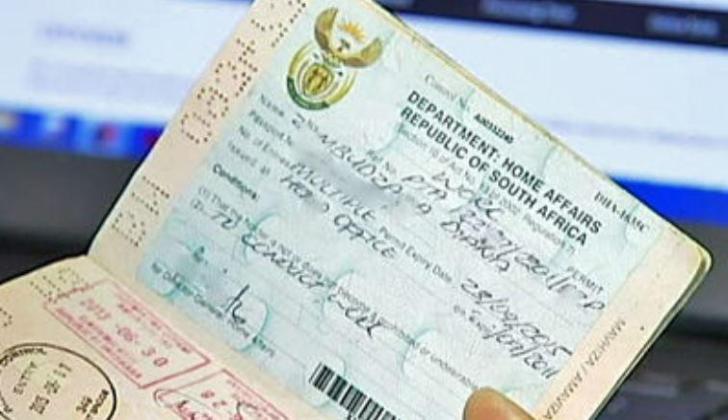News / National
SA court to hear challenge to Motsoaledi's decision on Zimbabwe Exemption Permits
09 Apr 2023 at 16:36hrs |
1 Views

The Helen Suzman Foundation's (HSF) challenge of home affairs minister Aaron Motsoaledi's decision to terminate the Zimbabwe exemption permit (ZEP), will be heard between 11 and 14 April, alongside two similar applications from the Zimbabwean Exemption Permit Holders Association and the Zimbabwean Immigration Federation.
The ZEP is due to expire on June 30.
The HSF wants the high court in Pretoria to declare the decision by Motsoaledi to terminate the ZEP - and his limited extension to the permit - unlawful, unconstitutional and invalid.
The application is being opposed by the home affairs minister.
HSF will argue that Minister of Home Affairs Aaron Motsoaledi terminated the ZEP without consulting its holders, nor measuring the decision’s impact on them or the South African society in which they have lawfully lived for more than a decade.
The ZEP is the third iteration of a permit that first began as the Dispensation for Zimbabwe Permit (DZP) in 2009. In order to qualify for the DZP and its successors applicants had to present Home Affairs with a clean criminal record.
"It is not the position of HSF that those migrants who are in South Africa unlawfully should be entitled to remain, nor even that the ZEP must continue in perpetuity," the foundation said.
"Rather, our position is that those who have scrupulously observed South Africa's laws in order to live and work here, under the ZEP, cannot have such permits terminated without fair process, good reason and a meaningful opportunity to regularise their status. It is what our constitutional order demands."
In November 2021, Cabinet made the decision not to renew the ZEP.
It raised the ire of Zimbabweans and rights groups, who approached the court on an urgent basis. They were, however, unsuccessful.
Civil rights groups argued it would be impossible for current permit holders to successfully apply for other permits.
The foundation said: "This special dispensation regime has offered legal protection to approximately 178 000 Zimbabwean nationals, allowing them to live, work and study in South Africa. It has prevailed for well over a decade, meaning that permit-holders have built lives, families and careers here, and contributed to South Africa and its economy.
At present, ZEP holders must have obtained other forms of residency authorisation — in the vast majority of cases, an almost impossible requirement — by 31 December 2022 or leave South Africa.
"They will be put to a desperate choice: to remain in South Africa as undocumented migrants with all the vulnerability that attaches to such status or return to a Zimbabwe that, to all intents and purposes, is unchanged from the country they fled.
"There are thousands of children, who have been born in South Africa to ZEP holders during this time, who have never even visited their parents' country of origin."
The ZEP is due to expire on June 30.
The HSF wants the high court in Pretoria to declare the decision by Motsoaledi to terminate the ZEP - and his limited extension to the permit - unlawful, unconstitutional and invalid.
The application is being opposed by the home affairs minister.
HSF will argue that Minister of Home Affairs Aaron Motsoaledi terminated the ZEP without consulting its holders, nor measuring the decision’s impact on them or the South African society in which they have lawfully lived for more than a decade.
The ZEP is the third iteration of a permit that first began as the Dispensation for Zimbabwe Permit (DZP) in 2009. In order to qualify for the DZP and its successors applicants had to present Home Affairs with a clean criminal record.
"It is not the position of HSF that those migrants who are in South Africa unlawfully should be entitled to remain, nor even that the ZEP must continue in perpetuity," the foundation said.
In November 2021, Cabinet made the decision not to renew the ZEP.
It raised the ire of Zimbabweans and rights groups, who approached the court on an urgent basis. They were, however, unsuccessful.
Civil rights groups argued it would be impossible for current permit holders to successfully apply for other permits.
The foundation said: "This special dispensation regime has offered legal protection to approximately 178 000 Zimbabwean nationals, allowing them to live, work and study in South Africa. It has prevailed for well over a decade, meaning that permit-holders have built lives, families and careers here, and contributed to South Africa and its economy.
At present, ZEP holders must have obtained other forms of residency authorisation — in the vast majority of cases, an almost impossible requirement — by 31 December 2022 or leave South Africa.
"They will be put to a desperate choice: to remain in South Africa as undocumented migrants with all the vulnerability that attaches to such status or return to a Zimbabwe that, to all intents and purposes, is unchanged from the country they fled.
"There are thousands of children, who have been born in South Africa to ZEP holders during this time, who have never even visited their parents' country of origin."
Source - online
Join the discussion
Loading comments…
































